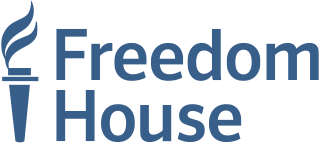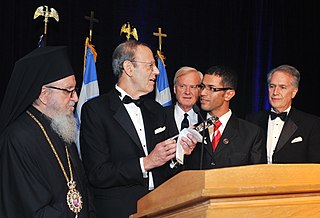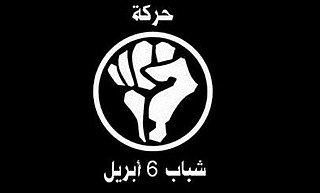
Human Rights Watch (HRW) is an international non-governmental organization headquartered in New York City that conducts research and advocacy on human rights. The group pressures governments, policymakers, companies, and individual human rights abusers to denounce abuse and respect human rights, and often works on behalf of refugees, children, migrants, and political prisoners.

Freedom House is a non-profit organization based in Washington, D.C. It is best known for political advocacy surrounding issues of democracy, political freedom, and human rights. Freedom House was founded in October 1941, with Wendell Willkie and Eleanor Roosevelt serving as its first honorary chairpersons. Its mission is to expand and defend freedom globally, and its vision is a world where all are free. Most of the organization's funding comes from the U.S. State Department and other government grants. It also receives funds from various semi-public and private foundations, as well as individual contributions.

The National Endowment for Democracy (NED) is a quasi-autonomous non-governmental organization in the United States founded in 1983 to advance democracy worldwide, by promoting political and economic institutions, such as political groups, trade unions, free markets, and business groups.

Reporters Without Borders is an international non-profit and non-governmental organisation focused on safeguarding the right to freedom of information. It describes its advocacy as founded on the belief that everyone requires access to the news and information, in line with Article 19 of the Universal Declaration of Human Rights that recognises the right to receive and share information regardless of frontiers, along with other international rights charters. RSF has consultative status at the United Nations, UNESCO, the Council of Europe, and the International Organisation of the Francophonie.
The Varela Project is a project that was started in 1998 by Oswaldo Payá of the Christian Liberation Movement (MCL) and named after Felix Varela, a Cuban religious leader.

The International Republican Institute (IRI) is an American nonprofit organization founded in 1983 and funded and supported by the United States federal government. Most of its board is drawn from the Republican Party. It is committed to advancing freedom and democracy worldwide by helping political parties to become more issue-based and responsive, assisting citizens to participate in government planning, and working to increase the role of marginalized groups in the political process, including women and youth. It was initially known as the National Republican Institute for International Affairs.

Oswaldo Payá Sardiñas was a Cuban political activist. A Roman Catholic, he founded the Christian Liberation Movement in 1987 to oppose the one-party rule of the Cuban Communist Party. He attracted international attention for organizing a petition drive known as the Varela Project, in which 25,000 signatories petitioned the Cuban government to guarantee freedom of speech and freedom of assembly as well as to institute a multi-party democracy. In recognition of his work, he received the European Parliament's Sakharov Prize and People in Need's Homo Homini Award.

The Cuban dissident movement is a political movement in Cuba whose aim is to replace the current government with a liberal democracy. According to Human Rights Watch, the Marxist-Leninist Cuban government represses nearly all forms of political dissent.

Óscar Elías Biscet González is a Cuban physician and an advocate for human rights and democratic freedoms in Cuba. He is also the founder of the Lawton Foundation.

Ayman Abd El Aziz Nour is an Egyptian politician, a former member of the Egyptian Parliament, founder and chairman of the El Ghad party. Nour was the first man to ever compete against President Hosni Mubarak in the 2005 presidential election. However shortly after announcing his candidacy, Nour was stripped of his parliamentary immunity and arrested on 29 January 2005, a move that was widely criticized by governments around the world as a step backwards for Egyptian democracy. Due to international pressure, Nour was released to participate in the election and was unsuccessful. The election was widely considered to be a corrupt and rigged election. He was arrested again shortly after and released nearly five years later. Nour left Egypt following the 2013 Egyptian coup d'état and spent time in Lebanon for treatment of a wound he sustained while in prison. Nour now resides in Istanbul, Turkey and expresses his hope for returning to Egypt.

The Human Rights Foundation (HRF) is a non-profit organization that focuses on promoting and protecting human rights globally, with an emphasis on closed societies. HRF organizes the Oslo Freedom Forum. The Human Rights Foundation was founded in 2005 by Thor Halvorssen Mendoza, a Venezuelan film producer and human rights advocate. The current chairman is Russian chess grandmaster Garry Kasparov, and Javier El-Hage is the current chief legal officer. The foundation's head office is in the Empire State Building in New York City.

The April 6 Youth Movement is an Egyptian activist group established in Spring 2008 to support the workers in El-Mahalla El-Kubra, an industrial town, who were planning to strike on 6 April.
Jorge Luis García Pérez is an Afro-Cuban human rights and democracy activist.

Oslo Freedom Forum (OFF) is a series of global conferences run by the New York–based non-profit Human Rights Foundation under the slogan "Challenging Power". OFF was founded in 2009 as a one-time event and has taken place annually ever since. The forum aims to bring together notable people, including former heads of state, winners of the Nobel Peace Prize, prisoners of conscience, as well as of other public figures in order to network and exchange ideas about human rights and exposing dictatorships.

The impact of the Arab Spring concerns protests or by the way attempts to organize growing protest movements that were inspired by or similar to the Arab Spring in the Arab-majority states of North Africa and the Middle East, according to commentators, organisers, and critics. These demonstrations and protest efforts have all been critical of the government in their respective countries, though they have ranged from calls for the incumbent government to make certain policy changes to attempts to bring down the current political system in its entirety. In some countries, protests have become large or widespread enough to effect change at the national level, as in Armenia, while in others, such as Djibouti, were swiftly suppressed.
Oxfam Novib/PEN Award for Freedom of Expression is a literary award made in collaboration with PEN International Writers in Prison Committee, the PEN Emergency Fund, and Oxfam Novib. The award is to recognize writers who have been persecuted for their work and continue working despite the consequences. Honorees receive €2,500.

Women played a variety of roles in the Arab Spring, but its impact on women and their rights is unclear. The Arab Spring was a series of demonstrations, protests, and civil wars against authoritarian regimes that started in Tunisia and spread to much of the Arab world. The leaders of Tunisia, Egypt, Libya, and Yemen were overthrown; Bahrain has experienced sustained civil disorder, and the protests in Syria have become a civil war. Other Arab countries experienced protests as well.
The Geneva Summit for Human Rights and Democracy is an annual human rights summit sponsored by a coalition of 20 non-governmental organizations. Each year, on the eve of the United Nations Human Rights Council's main annual session, activists from around the world meet to raise international awareness of human rights situations.

Benedict Richard Victor Rogers is a British human rights activist and journalist based in London. His work focuses on Asia, particularly Burma, North Korea, Indonesia, the Maldives, East Timor, Pakistan, and Hong Kong. He is a regular contributor to The Wall Street Journal, The New York Times and The Huffington Post and has appeared on BBC, CNN, Sky, Al Jazeera and other television and radio stations.















